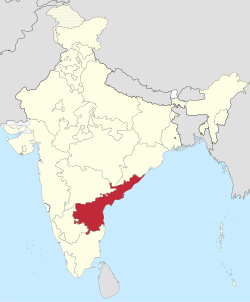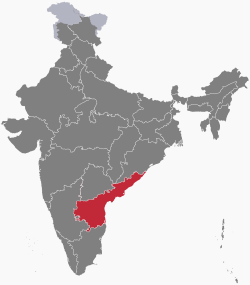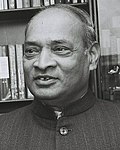| Chief Minister of Andhra Pradesh | |
|---|---|
| Āndhra Pradēś Mukhya Mantrī | |
 | |
| Chief Minister's Office Government of Andhra Pradesh | |
| Style | The Honourable (Formal) Mr./Mrs. Chief Minister (Informal) |
| Status | Head of government |
| Abbreviation | CMoAP |
| Member of | Andhra Pradesh Legislature Andhra Pradesh Council of Ministers |
| Reports to | Governor of Andhra Pradesh Andhra Pradesh Legislature |
| Seat | Andhra Pradesh Secretariat, Amaravati |
| Appointer | The governor of Andhra Pradesh |
| Term length | Five years and subject to no term limit at the confidence of the Legislative Assembly |
| Inaugural holder | Neelam Sanjeeva Reddy |
| Formation | 1 November 1956 |
| Deputy | Deputy Chief Minister of Andhra Pradesh |
| Website | Official website |
The chief minister of Andhra Pradesh is the chief executive of the Indian state of Andhra Pradesh. In accordance with the Constitution of India, the governor is a state's de jure head, but de facto executive authority rests with the chief minister. Following elections to the Andhra Pradesh Legislative Assembly, the state's governor usually invites the party (or coalition) with a majority of seats to form the government. The governor appoints the chief minister, whose council of ministers are collectively responsible to the assembly. Given that he has the confidence of the assembly, the chief minister's term is for five years and is subject to no term limits. [1]
Contents
- List of chief ministers
- 1953–1956
- Since 1956
- Statistics
- List by chief minister
- List by party
- Timeline
- See also
- Notes
- References
- External links
Since 1953, there have been 19 chief ministers with the majority of them belonging to the Indian National Congress (INC). In 1953, Tanguturi Prakasam from the INC became the first chief minister of the Andhra State. In 1956, Neelam Sanjeeva Reddy from the INC became the first chief minister of Andhra Pradesh post the reorganisation of Indian states. The longest-serving chief minister was N. Chandrababu Naidu from the Telugu Desam Party (TDP), who held the office for over thirteen years across multiple terms, while N. Bhaskara Rao from the TDP had the shortest tenure of 31 days. N. Chandrababu Naidu was also the first chief minister of the state post the bifurcation of Telangana in 2014. Later Neelam Sanjeeva Reddy went on to become the President of India, while P. V. Narasimha Rao, also from the INC and previously the fourth chief minister of Andhra Pradesh went on to serve as the Prime Minister of India. Notably, N. T. Rama Rao from the TDP was the first non-INC chief minister of the state. There have been three instances of President's rule in Andhra Pradesh, most recently in 2014.
The current incumbent N. Chandrababu Naidu has been from the Telugu Desam Party since 12 June 2024.























